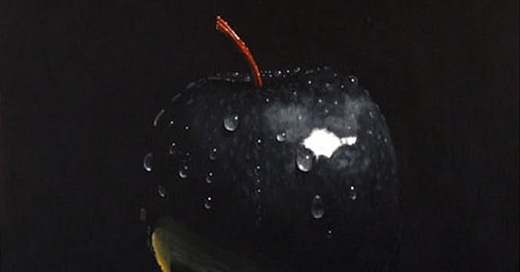Hey, it’s Alexandra. Welcome to my weekly newsletter where I share my latest reflections on professional development & well-being.
If you’re not a subscriber, here’s what you missed recently:
Subscribe to get future posts emailed to you:
This week, I’m sharing what my 7th-grade English teacher taught me about learning and life, including:
Why some of the best teachers are “scary”
How reflection “hooks” people into active learning mode
How being put on the spot sharpens your self-awareness (uncomfortable as it may be)
☕️ Read time: 3 mins (best with tea or coffee)
In my first year of high school, I had the scariest English teacher. It was September 2002 and I was 12 years old and in the 7th grade (in case you’re not from Quebec).
This teacher’s reputation for being “tough” preceded her SO much that on our first day of school, one of my classmates who’d been “warned” by his friends a year ahead of us to switch immediately if assigned to her class, did just that.
A gaggle of us were sketching lousy portraits of each other in art class while he marched around plotting his escape. He said—asserting “wisdom” from his older friends—that he would get his parents to weasel him out citing a schedule conflict.
He managed to pull it off. He uprooted his entire schedule to avoid this one teacher we had yet to lay eyes on.
I thought it was absurd. And 21 years later, I’m grateful that aside from making me extra nervous for that first class, he didn’t convince me to switch too. Here’s why. That “scary”, “tough” teacher? She was one of the best that school ever had.
Start with reflection
Looking back, she used a simple—and brilliant—method to spark our creative thinking at the start of each class (which, let’s face it, most high school classes failed to do).
Each time we walked through the door (and god knows you were never late because “punctuality signals respect”), there would be a quote written on the chalkboard and we were to silently settle in and write for ten minutes about how we interpreted what it meant.
Afterward, we’d shift into a lively discussion and debate different points of view. Our writing reflections were effectively the “hook” that put us into active learning mode for the rest of our time together.
Ask yourself why
One day, we got on the topic of clothing brands. And this teacher, to my horror, told seven of us wearing shirts with visible brand names to stand at the front of the class. So we did.
Then we all got a lecture on how buying things for the sake of a name when there was nothing distinctive about them otherwise was sheep-like.
I breathed a sigh of relief when the teacher singled me out as an “exception” because despite having Roxy plastered across my shirt, the brand was imposed with a “colourful design.”
Regardless of being dismissed from the clothing brand line of fire, I still felt embarrassed when I sat down at my desk. And I felt even worse facing my classmates who were still lined up like perps.
For the first time since I’d walked into that classroom a month prior, I started to think my peer who pulled a Houdini was smarter than I thought. “She is evil,” I remember thinking.
But then, I stopped to think about her question. I asked myself, “Do I really love Roxy? Or do I just associate it with being “cool” because my friends and classmates love it? And do they actually love it or are they just “under the influence” like I probably am?”
Ultimately, I realized my discomfort about being put on the spot about my clothing choice had less to do with someone questioning it and more to do with my not having thought much about it. That made me feel defensive. “Maybe she’s not evil,” I thought.
I realize now, despite disagreeing with her method, that she was simply trying to make a point—one most of us are blind to at age 12 as we embark on our five-year high school journey.
In the end, I kept wearing Roxy clothes because I affirmed I did like the brand (whose tagline is “make waves and move mountains”). But from then on, I was less likely to buy something plain and indistinctive “just because it was Roxy.” And I sure as hell paid more attention to what I wore to that teacher’s class. (The “colourful” shirt is still burned into my brain.)
Interpret
Over two decades later, my 12-year-old peer’s “escape from English” has come to represent a heap of wisdom I’ve gained since then. And to this day, because of how interesting those quote-inspired discussions were, I often find myself looking up quotes online to read other people’s interpretations of them.
This brings me to today’s tea time, rose-related Persian proverb:
“He who wants a rose must respect the thorn.”
I stumbled upon this interpretation from an unknown source and had to share it:
“You cannot achieve greatness in your art, if you aren't willing to sacrifice the time to master it. No excuses. Just write.”
This speaks to me as a writer continuously striving to improve. And funnily enough, it’s also a great analogy for my 7th-grade English teacher.
Yes, she was demanding, strict, and incredibly refined, and understandably that was intimidating to a bunch of 12 year olds, especially at a public school where the vibe was more laid back than a private school. But she instilled a sense of excellence in us.
In many ways, she did us the biggest service in preparing us for the real world by setting high standards, pushing us to achieve them, and challenging us along the way. She also taught us that praise is particularly meaningful when it’s hard-earned.
That said, if I had to pick one “enduring understanding” my 7th-grade English teacher left me with (and every great teacher leaves you with at least one), it would be this: the measure of a good teacher is only evident over time as you realize what they've taught you and how deeply it's transformed you.
Thanks for reading and have a wonder-full week,
P.S. My 7th-grade English teacher retired the following year. It seems symbolic that my first year at that school was her last. I was lucky to have the culmination of her teaching experience as part of my induction to high school. (My English classes over the next four years were a breeze by comparison. Only now do I realize what a shame that is.)
💛 Like or comment if you enjoyed this edition.
☕️ Let me know if you visit Montreal & we can grab coffee or tea.





Oh my gosh, is this a thing, strict English teachers that you never forget? Because I had this exact experience in high school. Mrs Dusenberry, I kid you not, was ruthlessly tough and demanding, and, I never learned so much from a teacher. I loved that teacher. No one fell asleep in her class, because she was interesting, brilliant, and dangerous all at the same time. But your teacher's "start with a reflection on a quote" exercise is brilliant. I love it. Might have to steal this one for my sessions.
Love this Ally (or is it Allie?, or always Alexandra?!). Looking back, all of my favorite teachers were the hardest. Every. Single. One.
For example, one was as Operations professor in my graduate program (who I still grab coffee with a couple of times a year), and another other was an AP Chemistry teacher (who I most recently saw a my aunt's funeral). These teachers were tough, but they also respected their role and the classroom they managed. This translated into some of the most impactful learning I had.